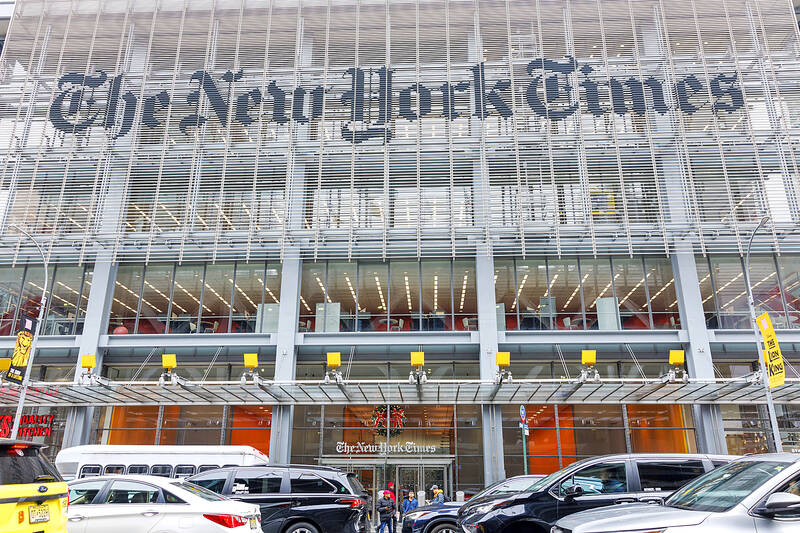The New York Times is suing Microsoft Corp and OpenAI Inc for using its content to help develop artificial intelligence (AI) services, in a sign of the increasingly fraught relationship between the media and a technology that could upend the news industry.
The technology firms rely on millions of copyrighted articles to train chatbots such as OpenAI’s ChatGPT and other AI features, allegedly causing billions of US dollars in statutory and actual damages, according to a lawsuit filed in New York on Wednesday.
The New York Times did not specify its monetary demands.

Photo: EPA-EFE
AI TRAINING
OpenAI has faced criticism for scraping text widely from the Web to train its popular chatbot since it debuted a year ago. While it has been sued by prominent authors, this is the first challenge to its practices by a major media organization.
The start-up has sought licensing deals with publishers, much like Alphabet Inc’s Google and Meta Platforms Inc’s Facebook have done.
The lawsuit says the publisher reached out to Microsoft and OpenAI in April and could not reach an amicable solution.
“We respect the rights of content creators and owners and are committed to working with them to ensure they benefit from AI technology and new revenue models,” an OpenAI spokesperson said in a statement. “Our ongoing conversations with the New York Times have been productive and moving forward constructively, so we are surprised and disappointed with this development.”
Microsoft declined to comment.
LAWSUITS
OpenAI in July signed an agreement with The Associated Press to access some of the news agency’s archives. OpenAI cut a three-year deal this month with Axel Springer SE to use the German media company’s work for an undisclosed sum.
“We’re hopeful that we will find a mutually beneficial way to work together, as we are doing with many other publishers,” the OpenAI spokesperson said.
OpenAI has been the target of multiple lawsuits from content producers complaining that their work has been improperly used for AI training. The company faces class actions from cultural figures, including comedian Sarah Silverman, Game of Thrones author George R.R. Martin and Pulitzer Prize-winning author Michael Chabon.
The cases are still in their early stages and could take years to fully resolve. A judge in San Francisco earlier this month hinted at trimming Silverman’s copyright lawsuit against OpenAI. The judge had already narrowed a similar Silverman suit against Meta.
Microsoft is OpenAI’s largest backer and has deployed the start-up’s AI tools in several of its products. In the lawsuit, the New York Times alleged that Microsoft copied the newspaper’s articles verbatim for its Bing search engine and used OpenAI’s technology to boost its value by US$1 trillion dollars.
“If Microsoft and OpenAI want to use our work for commercial purposes, the law requires that they first obtain our permission,” a New York Times spokesperson said in an e-mailed statement. “They have not done so.”

AT RISK: The council reiterated that people should seriously consider the necessity of visiting China, after Beijing passed 22 guidelines to punish ‘die-hard’ separatists The Mainland Affairs Council (MAC) has since Jan. 1 last year received 65 petitions regarding Taiwanese who were interrogated or detained in China, MAC Minister Chiu Chui-cheng (邱垂正) said yesterday. Fifty-two either went missing or had their personal freedoms restricted, with some put in criminal detention, while 13 were interrogated and temporarily detained, he said in a radio interview. On June 21 last year, China announced 22 guidelines to punish “die-hard Taiwanese independence separatists,” allowing Chinese courts to try people in absentia. The guidelines are uncivilized and inhumane, allowing Beijing to seize assets and issue the death penalty, with no regard for potential

STILL COMMITTED: The US opposes any forced change to the ‘status quo’ in the Strait, but also does not seek conflict, US Secretary of State Marco Rubio said US President Donald Trump’s administration released US$5.3 billion in previously frozen foreign aid, including US$870 million in security exemptions for programs in Taiwan, a list of exemptions reviewed by Reuters showed. Trump ordered a 90-day pause on foreign aid shortly after taking office on Jan. 20, halting funding for everything from programs that fight starvation and deadly diseases to providing shelters for millions of displaced people across the globe. US Secretary of State Marco Rubio, who has said that all foreign assistance must align with Trump’s “America First” priorities, issued waivers late last month on military aid to Israel and Egypt, the

‘UNITED FRONT’ FRONTS: Barring contact with Huaqiao and Jinan universities is needed to stop China targeting Taiwanese students, the education minister said Taiwan has blacklisted two Chinese universities from conducting academic exchange programs in the nation after reports that the institutes are arms of Beijing’s United Front Work Department, Minister of Education Cheng Ying-yao (鄭英耀) said in an exclusive interview with the Chinese-language Liberty Times (the Taipei Times’ sister paper) published yesterday. China’s Huaqiao University in Xiamen and Quanzhou, as well as Jinan University in Guangzhou, which have 600 and 1,500 Taiwanese on their rolls respectively, are under direct control of the Chinese government’s political warfare branch, Cheng said, citing reports by national security officials. A comprehensive ban on Taiwanese institutions collaborating or

France’s nuclear-powered aircraft carrier and accompanying warships were in the Philippines yesterday after holding combat drills with Philippine forces in the disputed South China Sea in a show of firepower that would likely antagonize China. The Charles de Gaulle on Friday docked at Subic Bay, a former US naval base northwest of Manila, for a break after more than two months of deployment in the Indo-Pacific region. The French carrier engaged with security allies for contingency readiness and to promote regional security, including with Philippine forces, navy ships and fighter jets. They held anti-submarine warfare drills and aerial combat training on Friday in